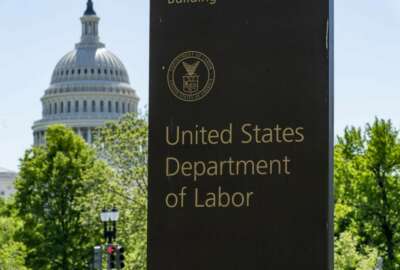

The Cyberspace Solarium Commission has come out with a new set of recommendations. Some of them would make the ban on Chinese telecom gear just the beginning.
Best listening experience is on Chrome, Firefox or Safari. Subscribe to Federal Drive’s daily audio interviews on Apple Podcasts or PodcastOne.
The Congressionally-chartered Cyberspace Solarium Commission has come out with a new set of recommendations. Some of them would make the ban on Chinese telecommunications gear just the beginning. With his take, federal sales and marketing consultant Larry Allen joined Federal Drive with Tom Temin.
Interview transcript:
Tom Temin: Larry, that was interesting to see what they’re proposing because they want to really get manufacturing in the United States up and running to replace what’s coming in from China across the board.
Larry Allen: Tom, what they’re really talking about here with this recommendation is getting all Chinese made product out of the US Federal Supply Chain, whether it’s Information Technology, telecommunication, whatever it is, if it can’t be made in the US, the Solarium report is recommending that they have it sourced from an ally, or that the United States come together with public-private partnerships to ensure that we’re not reliant on overseas sources, particularly for critical components. And I think there are two parts to this. One, clearly everybody got a wake up call from COVID when we had shortages, particularly at the beginning of the outbreak, there were shortages in the supply chain. And then more recently, when it became apparent that we had some potential real security issues with Chinese made technology in certain parts of the supply chain. So this ungainly named Commission, the Cybersecurity Solarium has made this recommendation. And despite the name, it’s important to understand that this is actually a very influential group. And a number of the recommendations that they’ve made have already been incorporated into legislation. And I suspect we’re going to see more of their recommendations in public policy moving forward.
Tom Temin: In some ways, this is not a new issue for federal buyers because Chinese made goods outright have generally been barred, say PCs, which are largely made in China. But some companies have set up US assembly just for meeting the federal market, some of the big companies like Dell, and Lenovo, and so on. But I guess this is getting beyond the prime product level into the contents, which even though a piece might be assembled here, most of the components or a great number of the components are nevertheless made in China. So it gets deeper, doesn’t it?
Larry Allen: Tom you hit on a good point. This transcends the existing Trade Agreements Act and Buy American Act that can be applied governmentwide, as well as the Berry Amendment that applies to certain Department of Defense procurements. This Solarium Commission report talks about getting Chinese made goods out of federal supply chain pretty much entirely, and in that way, it’s much closer to a provision that actually made it into this year’s house version of the FY 21 defense bill that would require major systems components to be 100% US made. Right now, whether it’s the legislation or the commission recommendation, we certainly don’t have the capacity to meet the goal that they’re talking about. That’s why the commission reports talking about partnerships, talking about allied governments, so that we can transition over time, we don’t have to do it all ourselves. But Tom, this is clearly a major trend in government acquisition, this whole becoming more reliant on ourselves, becoming less reliant on people who may or may not always have our best national security interest at hear. It’s something that could be very costly, but it also could be a huge job creator. It’s something that if it’s taken to its logical conclusion, would really fundamentally shift the type of work that’s done in this country, who does it, how it’s done, and probably change the components of the technology that we use from what we’re used to today.
Tom Temin: So is there anything contractors ought to be doing now? Or can they do anything at this point while this is all simply fresh proposals?
Larry Allen: Well, we don’t really know where the balls going to land, the ball is still very much on the roulette board, Tom. So if you don’t know, if it’s gonna land on black, green, or red, the best thing that contractor can do is to watch where the ball is, but also to be prepared. We don’t know how much you’re going to have to add a domestic component to your supply chain. But we can bet that you’re going to have to add some much more significant domestic component to what you sell to the US government moving forward. So you ought to be starting to look at those suppliers that are either domestic or in places where we have agreements like with Canada and Mexico and maybe some of our European allies to begin to source things. And the other thing you start thinking about is those components that you can’t get anywhere else. How can you make those products by using different components? I think that’s going to be one of the significant challenges. So companies, I think, Tom, had better start to prepare for this, even though we don’t have any conclusions.
Tom Temin: And switching gears here to an old issue, and that is compliance with multiple award schedule rules, which are shifting over the decades from time to time. There is now a guide out that you’re pointing out.
Larry Allen: There is. GSA overall Tom is doing a really great job in the Schedules program in terms of providing education to contractors, based on what they’ve historically done. It used to be that the agency put out very little if any guidance and the training, frankly, that it put out maybe seven or eight years ago, wasn’t the best. So now GSA has really stepped up its contractor training. And one of the most recent things they’ve done is issued a brand new guide for schedule contractors. This is a guide that takes a company through a typical assessment visit. These are the regular routine, either annual or semi annual, biannual visits that GSA evaluators do. They’re not big audits but they are contractor reviews. And this guide is a step by step guide for contractors on how to make sure they’re ready for those assessments so that they’re doing the double checking of their own systems. Are they collecting the industrial funding fee correctly? Do they have a system for referring they’re compliant with the Trade Agreements Act, something we were just talking about? It’s that type of thing that a company should really take the time, go through the guide, go through it internally so that they’re sure that they’ve got the compliance systems in place. If they don’t, they can create the systems. And if they discover a problem, it’s much better to discover a potential problem yourself Tom, than wait for a government auditor to come find it for you.
Tom Temin: And this as the program to collapse all of the different schedules into one big schedule proceeds a pace.
Larry Allen: It is proceeding a pace. We are now at the point where GSA is starting to combine the contracts of companies that have had three or four different schedules into one master schedule. This is kind of the phase three of the program. And phase three really only impacts a few contractors, but it’s going to take several years probably to accommodate. But we’re starting to see some tweaks along the way as well. GSA is looking at the sub structure of the Schedules program in order to make sure that their consolidation meets the goal that they had set out, which was to make it easier for federal buyers to find things on the Schedules program. So what’s really kind of good about this process is GSA has done a nice job with it. But they realize it’s not a static process, they’re still fine tuning it to make sure that they get it as good as possible so that it really meets the needs of their customer base.
Tom Temin: And interestingly, it mentions the compliance with Trade Agreements Act, which gets us back to the China question in some way.
Larry Allen: Tom, in the Schedules program, and it’s not just in the schedules, but in the Schedules program, particularly the Trade Agreements Ac is, the number two compliance issue, it falls right behind compliance with your pricing responsibilities on schedule. Schedule contractors are those on any other indefinite delivery, indefinite quantity contract — need to take their Trade Agreements Act compliance responsibilities seriously. There are so many lawyers out there, so many plaintiffs, bar lawyers who would like to take a whistleblower case to do a gotcha on a company that may not be paying full time and attention. It’s really important to understand that you’ve got your Trade Agreement Act compliance system as good as it can be, and that you’re giving it the proper care and feeding. It certainly cost you a little bit of money upfront to do that. It costs a little time to go through the compliance guide that GSA put out. But these are literally pennies on the dollar investments, Tom, for any company to make sure that they’re doing what they should be doing. And as I like to say, if you do that, the government will write you checks, and you will not have to write checks back to the government.
Tom Temin: Larry Allen is president of Allen Federal Business Partners. Thanks so much.
Larry Allen: Tom, I thank you and I wish your listeners happy selling.
Copyright © 2024 Federal News Network. All rights reserved. This website is not intended for users located within the European Economic Area.
Tom Temin is host of the Federal Drive and has been providing insight on federal technology and management issues for more than 30 years.
Follow @tteminWFED


